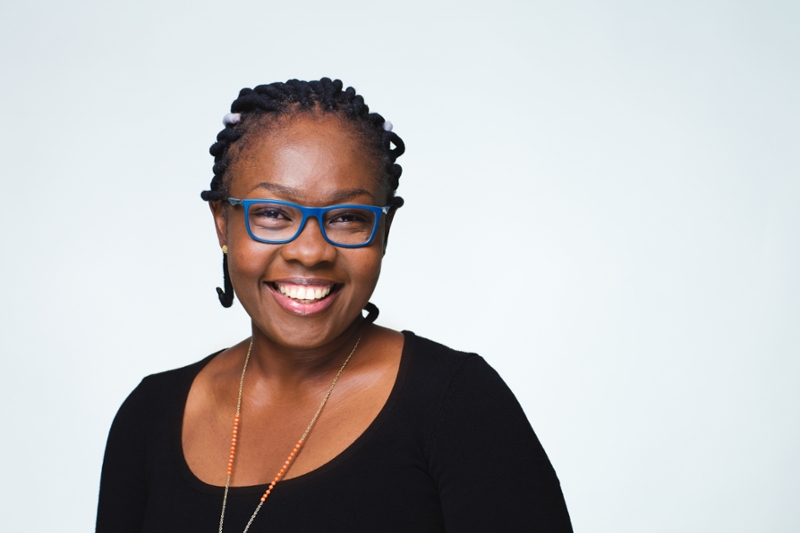Education is the first step toward doing better
Author: Olive Ozoemena
Posted on Feb 15, 2021
Category: Inspiring Stories , UNB Saint John

My name is Olive Ozoemena and I am from Nigeria where I worked in the banking sector. I received my Master's degree in Human Resource Development in the United States and then in 2015, I moved to Saint John.
I firmly believe that business ultimately boils down to human capital management. Because of this, I began searching for an MBA program that was relatively affordable, but most importantly, a shorter year-long program. The University of New Brunswick popped up during my search. I had not heard of New Brunswick, let alone Saint John. Actually, one of my friends chuckled that I was going to a city with an additional weird 30-minute time difference (at the time we thought I was going to St. John’s, Nfld.). I am not sure what I expected from this little corner of the world, but I certainly did not expect to find a community of people that I have come to love and advocate for. This love has promoted a desire to make my new home a more inclusive and welcoming place.
Upon completing my MBA program at UNBSJ I secured an internship with WorksafeNB, where I worked on business process improvement with the Compliance and HR departments. My career took a significant turn when I secured an opportunity with Newcomer Connections at the YMCA as a project coordinator. The Coordinating Skills Launch project launched me to a new world of service; the impact, reach, opportunities and transformation I saw happen in people’s lives through collaboration, drive, shared common goal touched my life in a way I never thought it could. Today, I am the Manager of Newcomer Programs at YMCA, Newcomer Connections. I work with highly skilled and multi-talented “superhumans” who help, support, train, and mentor newcomers to our region and create pathways to meaningful employment and settlement. Working with newcomers of diverse backgrounds, religion, ethnicities, and beliefs drive me to advocate for and foster change in our community through conversations, programs, discussions, policies, and collaborations.
In my 5+ years in Canada (all in Saint John), I have met incredible humans that today I call friends, some are my mentors (they may not know this), some have positively challenged me, some have fiercely disagreed with or even belittled me, and some look up to me. All of these experiences contribute to why I love this city that has become my home. I truly believe that our diversity of perspectives and experiences make us stronger. This encourages me to continuously advocate for change.
In Nigeria, even though we have numerous tribes and ethnicities with over 500 languages, racism is rarely a common or controversial topic. Being Black or looking different had never been a “determining factor”. I walk into a room and I am only worried about how what I say or how I act affect other people. Never had I ever worried that having a different skin colour would be the only thing I could be judged by until I moved to North America where being Black can be considered inferior. I never understood that until I started hearing, reading, seeing stories of marginalization, oppression, indignities, racist acts and comments - including here in Saint John. I cannot by any margin claim that my experience as a Black person is the same as any Indigenous Black Canadian. I walk into a room each time with my head held up high, without a worry about how my colour of skin could offend anybody, but that cannot be said for every person of African descent in Saint John.
Personally, I cannot tell you that I have directly experienced racism in Saint John but that does not mean it has not happened, it just does not register for me and it is for the single fact that my brain was not wired from an early age to recognize that I have been treated differently because of the colour of my skin. It is a sad reality but racism exists here in Saint John/New Brunswick/Canada, and I cannot ignore the fact that People of Colour suffer through difficult and painful situations everyday. We must acknowledge that racism exists here.
I have been privy to personal stories of demeaning treatment, wrongful accusation, in-your-face racists acts and comments experienced by my friends, clients, colleagues, and acquaintances here in Saint John. So even though I may not have recognized acts of racism towards myself personally, I fully appreciate and recognize the fact that my fellow People of Colour, and other marginalized minority groups that live in this country, have lived experiences of being targeted or treated differently simply because they do not look like the dominant race. A recent ugly incident towards a newcomer here in Saint John is evidence that we still have miles to go in checking our privileges, unconscious biases, and ignorance. Our generation may not have participated in these heinous and dehumanizing acts but we inherited them and still live within systems that continue to privilege and benefit White people.
I maintain that the first steps to dealing with our unconscious biases and recognizing our privileges is through education. We need to read books, watch movies, listen to stories, research Black histories and do better. We must look for the empowering stories of Blacks that lived and still live here to learn how they contribute(d) to the world we live in today, otherwise our future will continue to be fraught with misunderstanding and conflicts.
Saint John has become my home, thanks to the University of New Brunswick that attracted me here. I deeply desire for my home to be one in which everyone is welcomed, respected and have equal opportunities to be who they are without trepidations.